Holiday Inn: Evaluation of Hospitality Operation Management Report
VerifiedAdded on 2020/12/09
|14
|3917
|230
Report
AI Summary
This report provides a comprehensive analysis of hospitality operation management, using Holiday Inn as a case study. It begins by defining the nature of hospitality products and services, including inseparability, intangibility, and perishability, and then explores the factors influencing demand patterns such as seasonality, health trends, and economic conditions. The report compares customer profiles, highlighting differing expectations and spending powers across income groups, with Holiday Inn's target market being the elite and high classes. It then delves into the key stages of product and service development, from idea generation to launch, and evaluates factors affecting customer perception like brand image and service style. Opportunities and constraints within the hospitality sector, including brand image, nutritional requirements, and accommodation facilities, are assessed. Finally, the report examines pricing methods, revenue generation, performance measures, and appraisal techniques within the context of hospitality operations.
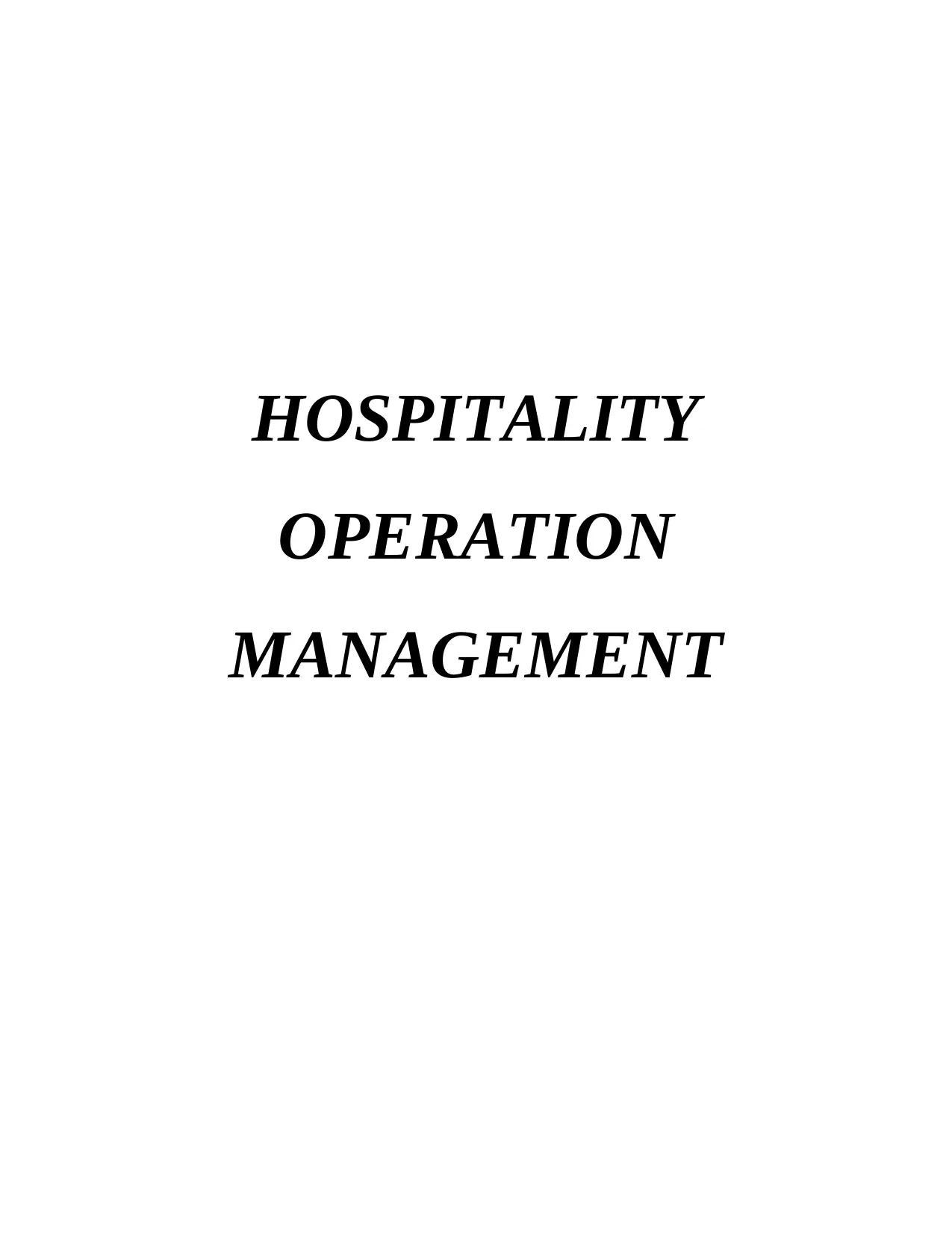
HOSPITALITY
OPERATION
MANAGEMENT
OPERATION
MANAGEMENT
Paraphrase This Document
Need a fresh take? Get an instant paraphrase of this document with our AI Paraphraser
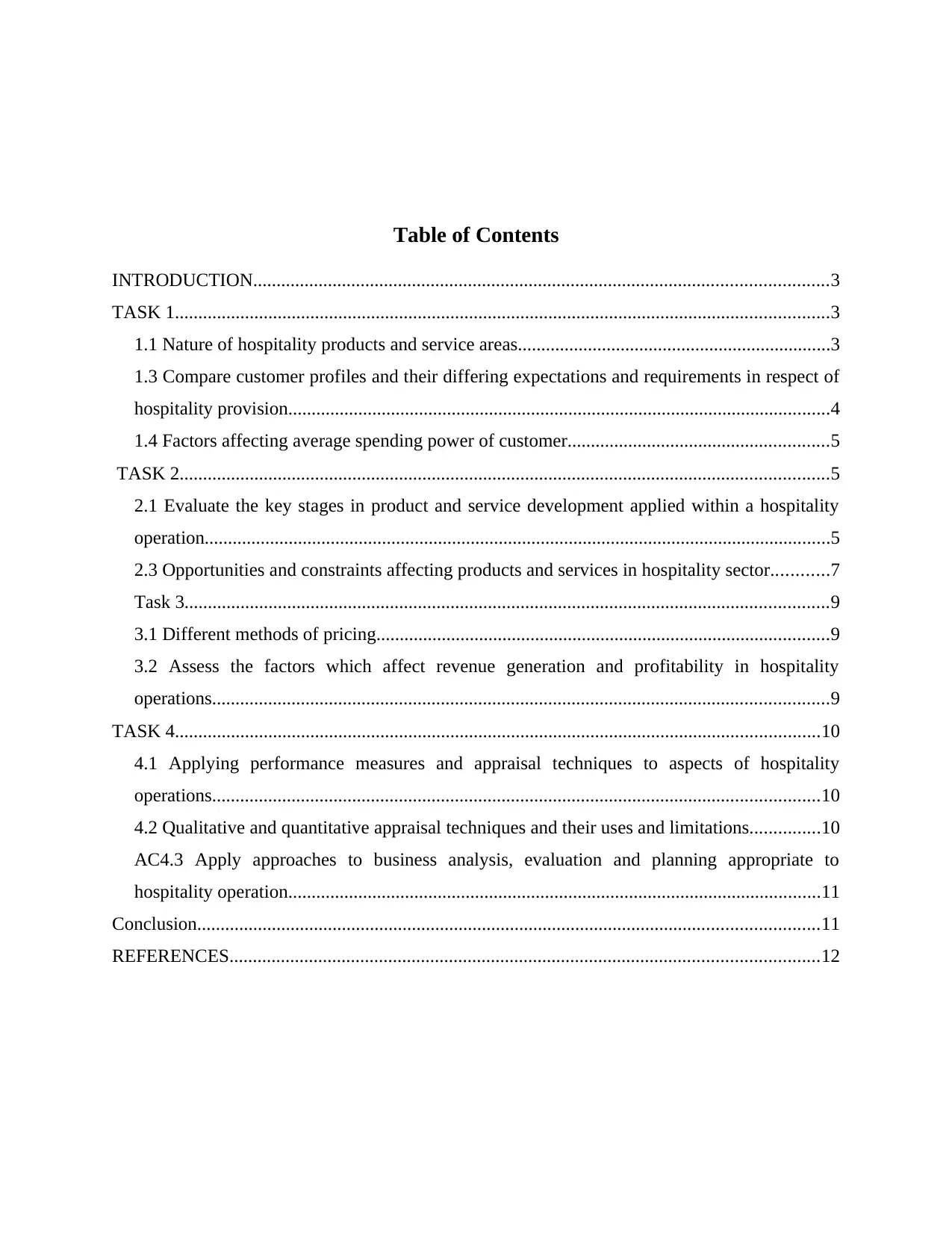
Table of Contents
INTRODUCTION...........................................................................................................................3
TASK 1............................................................................................................................................3
1.1 Nature of hospitality products and service areas...................................................................3
1.3 Compare customer profiles and their differing expectations and requirements in respect of
hospitality provision....................................................................................................................4
1.4 Factors affecting average spending power of customer........................................................5
TASK 2...........................................................................................................................................5
2.1 Evaluate the key stages in product and service development applied within a hospitality
operation......................................................................................................................................5
2.3 Opportunities and constraints affecting products and services in hospitality sector............7
Task 3..........................................................................................................................................9
3.1 Different methods of pricing.................................................................................................9
3.2 Assess the factors which affect revenue generation and profitability in hospitality
operations....................................................................................................................................9
TASK 4..........................................................................................................................................10
4.1 Applying performance measures and appraisal techniques to aspects of hospitality
operations..................................................................................................................................10
4.2 Qualitative and quantitative appraisal techniques and their uses and limitations...............10
AC4.3 Apply approaches to business analysis, evaluation and planning appropriate to
hospitality operation..................................................................................................................11
Conclusion.....................................................................................................................................11
REFERENCES..............................................................................................................................12
INTRODUCTION...........................................................................................................................3
TASK 1............................................................................................................................................3
1.1 Nature of hospitality products and service areas...................................................................3
1.3 Compare customer profiles and their differing expectations and requirements in respect of
hospitality provision....................................................................................................................4
1.4 Factors affecting average spending power of customer........................................................5
TASK 2...........................................................................................................................................5
2.1 Evaluate the key stages in product and service development applied within a hospitality
operation......................................................................................................................................5
2.3 Opportunities and constraints affecting products and services in hospitality sector............7
Task 3..........................................................................................................................................9
3.1 Different methods of pricing.................................................................................................9
3.2 Assess the factors which affect revenue generation and profitability in hospitality
operations....................................................................................................................................9
TASK 4..........................................................................................................................................10
4.1 Applying performance measures and appraisal techniques to aspects of hospitality
operations..................................................................................................................................10
4.2 Qualitative and quantitative appraisal techniques and their uses and limitations...............10
AC4.3 Apply approaches to business analysis, evaluation and planning appropriate to
hospitality operation..................................................................................................................11
Conclusion.....................................................................................................................................11
REFERENCES..............................................................................................................................12
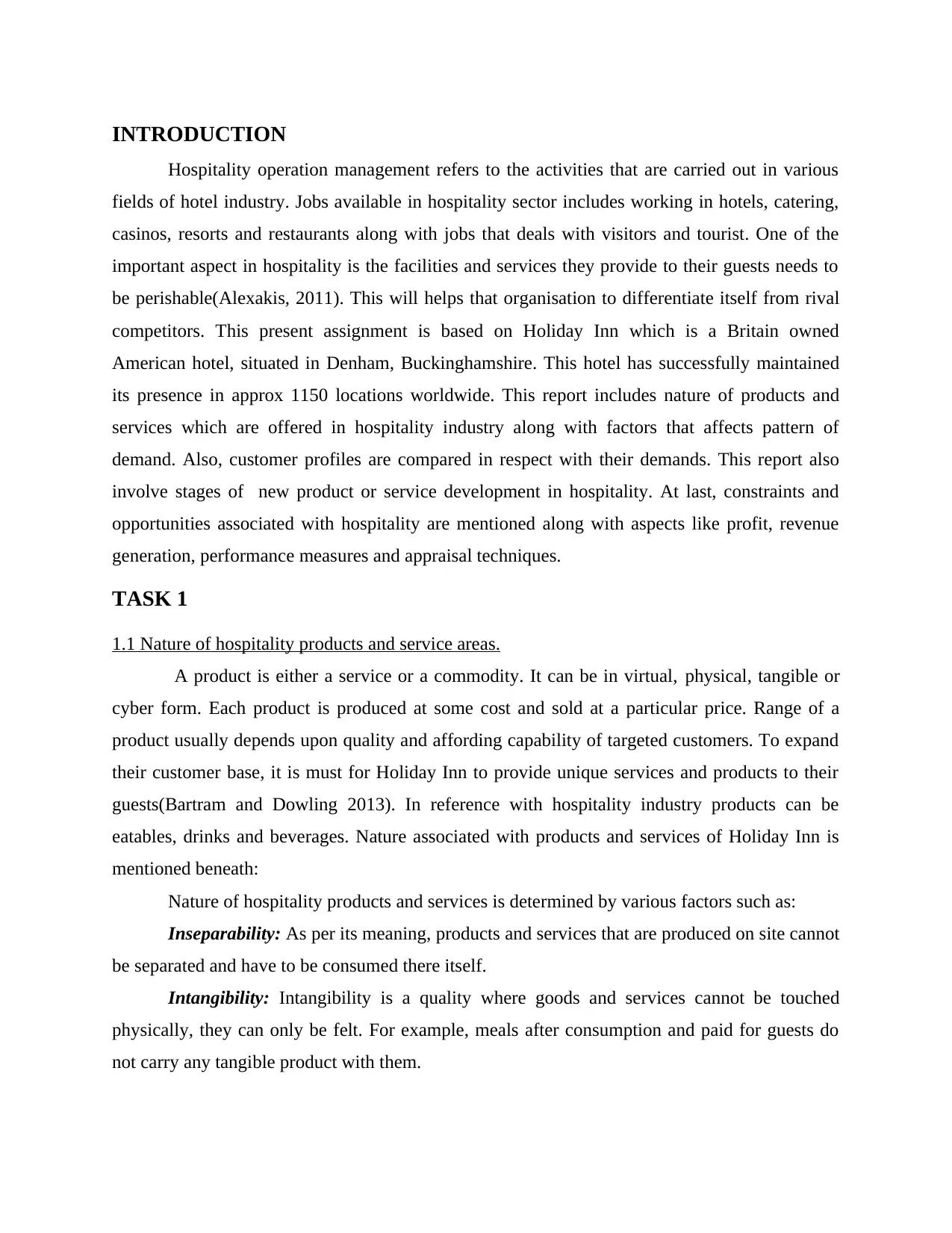
INTRODUCTION
Hospitality operation management refers to the activities that are carried out in various
fields of hotel industry. Jobs available in hospitality sector includes working in hotels, catering,
casinos, resorts and restaurants along with jobs that deals with visitors and tourist. One of the
important aspect in hospitality is the facilities and services they provide to their guests needs to
be perishable(Alexakis, 2011). This will helps that organisation to differentiate itself from rival
competitors. This present assignment is based on Holiday Inn which is a Britain owned
American hotel, situated in Denham, Buckinghamshire. This hotel has successfully maintained
its presence in approx 1150 locations worldwide. This report includes nature of products and
services which are offered in hospitality industry along with factors that affects pattern of
demand. Also, customer profiles are compared in respect with their demands. This report also
involve stages of new product or service development in hospitality. At last, constraints and
opportunities associated with hospitality are mentioned along with aspects like profit, revenue
generation, performance measures and appraisal techniques.
TASK 1
1.1 Nature of hospitality products and service areas.
A product is either a service or a commodity. It can be in virtual, physical, tangible or
cyber form. Each product is produced at some cost and sold at a particular price. Range of a
product usually depends upon quality and affording capability of targeted customers. To expand
their customer base, it is must for Holiday Inn to provide unique services and products to their
guests(Bartram and Dowling 2013). In reference with hospitality industry products can be
eatables, drinks and beverages. Nature associated with products and services of Holiday Inn is
mentioned beneath:
Nature of hospitality products and services is determined by various factors such as:
Inseparability: As per its meaning, products and services that are produced on site cannot
be separated and have to be consumed there itself.
Intangibility: Intangibility is a quality where goods and services cannot be touched
physically, they can only be felt. For example, meals after consumption and paid for guests do
not carry any tangible product with them.
Hospitality operation management refers to the activities that are carried out in various
fields of hotel industry. Jobs available in hospitality sector includes working in hotels, catering,
casinos, resorts and restaurants along with jobs that deals with visitors and tourist. One of the
important aspect in hospitality is the facilities and services they provide to their guests needs to
be perishable(Alexakis, 2011). This will helps that organisation to differentiate itself from rival
competitors. This present assignment is based on Holiday Inn which is a Britain owned
American hotel, situated in Denham, Buckinghamshire. This hotel has successfully maintained
its presence in approx 1150 locations worldwide. This report includes nature of products and
services which are offered in hospitality industry along with factors that affects pattern of
demand. Also, customer profiles are compared in respect with their demands. This report also
involve stages of new product or service development in hospitality. At last, constraints and
opportunities associated with hospitality are mentioned along with aspects like profit, revenue
generation, performance measures and appraisal techniques.
TASK 1
1.1 Nature of hospitality products and service areas.
A product is either a service or a commodity. It can be in virtual, physical, tangible or
cyber form. Each product is produced at some cost and sold at a particular price. Range of a
product usually depends upon quality and affording capability of targeted customers. To expand
their customer base, it is must for Holiday Inn to provide unique services and products to their
guests(Bartram and Dowling 2013). In reference with hospitality industry products can be
eatables, drinks and beverages. Nature associated with products and services of Holiday Inn is
mentioned beneath:
Nature of hospitality products and services is determined by various factors such as:
Inseparability: As per its meaning, products and services that are produced on site cannot
be separated and have to be consumed there itself.
Intangibility: Intangibility is a quality where goods and services cannot be touched
physically, they can only be felt. For example, meals after consumption and paid for guests do
not carry any tangible product with them.
⊘ This is a preview!⊘
Do you want full access?
Subscribe today to unlock all pages.

Trusted by 1+ million students worldwide
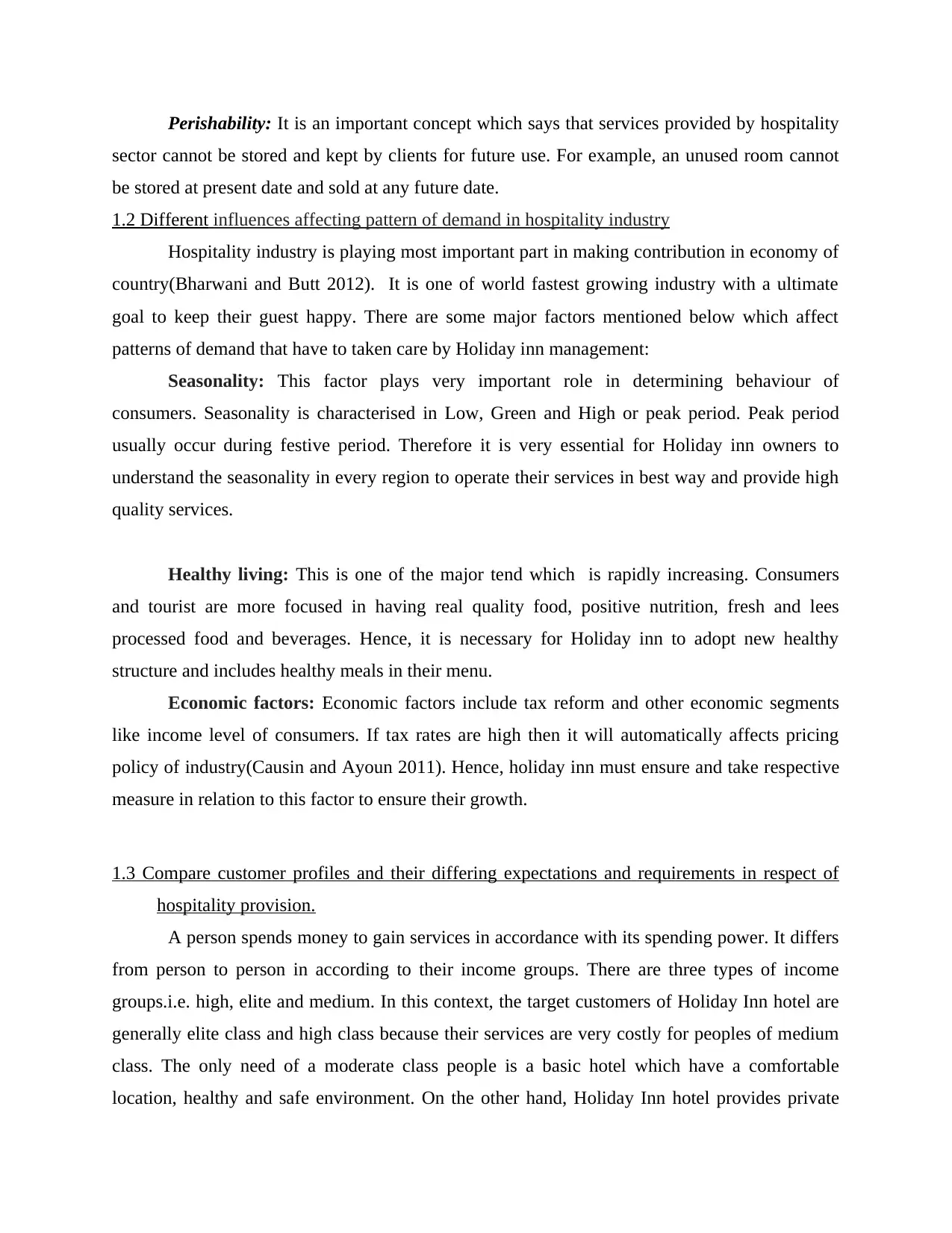
Perishability: It is an important concept which says that services provided by hospitality
sector cannot be stored and kept by clients for future use. For example, an unused room cannot
be stored at present date and sold at any future date.
1.2 Different influences affecting pattern of demand in hospitality industry
Hospitality industry is playing most important part in making contribution in economy of
country(Bharwani and Butt 2012). It is one of world fastest growing industry with a ultimate
goal to keep their guest happy. There are some major factors mentioned below which affect
patterns of demand that have to taken care by Holiday inn management:
Seasonality: This factor plays very important role in determining behaviour of
consumers. Seasonality is characterised in Low, Green and High or peak period. Peak period
usually occur during festive period. Therefore it is very essential for Holiday inn owners to
understand the seasonality in every region to operate their services in best way and provide high
quality services.
Healthy living: This is one of the major tend which is rapidly increasing. Consumers
and tourist are more focused in having real quality food, positive nutrition, fresh and lees
processed food and beverages. Hence, it is necessary for Holiday inn to adopt new healthy
structure and includes healthy meals in their menu.
Economic factors: Economic factors include tax reform and other economic segments
like income level of consumers. If tax rates are high then it will automatically affects pricing
policy of industry(Causin and Ayoun 2011). Hence, holiday inn must ensure and take respective
measure in relation to this factor to ensure their growth.
1.3 Compare customer profiles and their differing expectations and requirements in respect of
hospitality provision.
A person spends money to gain services in accordance with its spending power. It differs
from person to person in according to their income groups. There are three types of income
groups.i.e. high, elite and medium. In this context, the target customers of Holiday Inn hotel are
generally elite class and high class because their services are very costly for peoples of medium
class. The only need of a moderate class people is a basic hotel which have a comfortable
location, healthy and safe environment. On the other hand, Holiday Inn hotel provides private
sector cannot be stored and kept by clients for future use. For example, an unused room cannot
be stored at present date and sold at any future date.
1.2 Different influences affecting pattern of demand in hospitality industry
Hospitality industry is playing most important part in making contribution in economy of
country(Bharwani and Butt 2012). It is one of world fastest growing industry with a ultimate
goal to keep their guest happy. There are some major factors mentioned below which affect
patterns of demand that have to taken care by Holiday inn management:
Seasonality: This factor plays very important role in determining behaviour of
consumers. Seasonality is characterised in Low, Green and High or peak period. Peak period
usually occur during festive period. Therefore it is very essential for Holiday inn owners to
understand the seasonality in every region to operate their services in best way and provide high
quality services.
Healthy living: This is one of the major tend which is rapidly increasing. Consumers
and tourist are more focused in having real quality food, positive nutrition, fresh and lees
processed food and beverages. Hence, it is necessary for Holiday inn to adopt new healthy
structure and includes healthy meals in their menu.
Economic factors: Economic factors include tax reform and other economic segments
like income level of consumers. If tax rates are high then it will automatically affects pricing
policy of industry(Causin and Ayoun 2011). Hence, holiday inn must ensure and take respective
measure in relation to this factor to ensure their growth.
1.3 Compare customer profiles and their differing expectations and requirements in respect of
hospitality provision.
A person spends money to gain services in accordance with its spending power. It differs
from person to person in according to their income groups. There are three types of income
groups.i.e. high, elite and medium. In this context, the target customers of Holiday Inn hotel are
generally elite class and high class because their services are very costly for peoples of medium
class. The only need of a moderate class people is a basic hotel which have a comfortable
location, healthy and safe environment. On the other hand, Holiday Inn hotel provides private
Paraphrase This Document
Need a fresh take? Get an instant paraphrase of this document with our AI Paraphraser
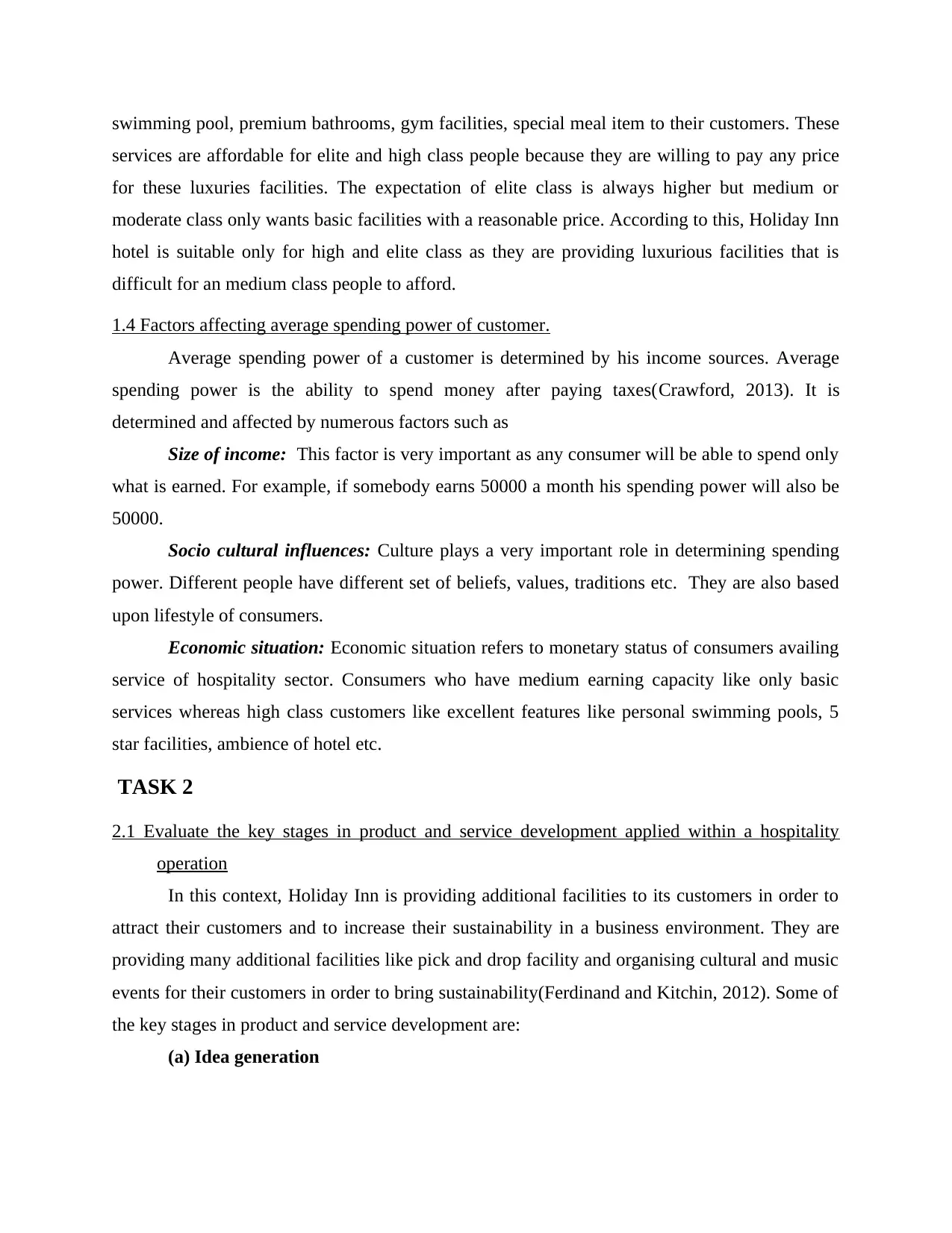
swimming pool, premium bathrooms, gym facilities, special meal item to their customers. These
services are affordable for elite and high class people because they are willing to pay any price
for these luxuries facilities. The expectation of elite class is always higher but medium or
moderate class only wants basic facilities with a reasonable price. According to this, Holiday Inn
hotel is suitable only for high and elite class as they are providing luxurious facilities that is
difficult for an medium class people to afford.
1.4 Factors affecting average spending power of customer.
Average spending power of a customer is determined by his income sources. Average
spending power is the ability to spend money after paying taxes(Crawford, 2013). It is
determined and affected by numerous factors such as
Size of income: This factor is very important as any consumer will be able to spend only
what is earned. For example, if somebody earns 50000 a month his spending power will also be
50000.
Socio cultural influences: Culture plays a very important role in determining spending
power. Different people have different set of beliefs, values, traditions etc. They are also based
upon lifestyle of consumers.
Economic situation: Economic situation refers to monetary status of consumers availing
service of hospitality sector. Consumers who have medium earning capacity like only basic
services whereas high class customers like excellent features like personal swimming pools, 5
star facilities, ambience of hotel etc.
TASK 2
2.1 Evaluate the key stages in product and service development applied within a hospitality
operation
In this context, Holiday Inn is providing additional facilities to its customers in order to
attract their customers and to increase their sustainability in a business environment. They are
providing many additional facilities like pick and drop facility and organising cultural and music
events for their customers in order to bring sustainability(Ferdinand and Kitchin, 2012). Some of
the key stages in product and service development are:
(a) Idea generation
services are affordable for elite and high class people because they are willing to pay any price
for these luxuries facilities. The expectation of elite class is always higher but medium or
moderate class only wants basic facilities with a reasonable price. According to this, Holiday Inn
hotel is suitable only for high and elite class as they are providing luxurious facilities that is
difficult for an medium class people to afford.
1.4 Factors affecting average spending power of customer.
Average spending power of a customer is determined by his income sources. Average
spending power is the ability to spend money after paying taxes(Crawford, 2013). It is
determined and affected by numerous factors such as
Size of income: This factor is very important as any consumer will be able to spend only
what is earned. For example, if somebody earns 50000 a month his spending power will also be
50000.
Socio cultural influences: Culture plays a very important role in determining spending
power. Different people have different set of beliefs, values, traditions etc. They are also based
upon lifestyle of consumers.
Economic situation: Economic situation refers to monetary status of consumers availing
service of hospitality sector. Consumers who have medium earning capacity like only basic
services whereas high class customers like excellent features like personal swimming pools, 5
star facilities, ambience of hotel etc.
TASK 2
2.1 Evaluate the key stages in product and service development applied within a hospitality
operation
In this context, Holiday Inn is providing additional facilities to its customers in order to
attract their customers and to increase their sustainability in a business environment. They are
providing many additional facilities like pick and drop facility and organising cultural and music
events for their customers in order to bring sustainability(Ferdinand and Kitchin, 2012). Some of
the key stages in product and service development are:
(a) Idea generation
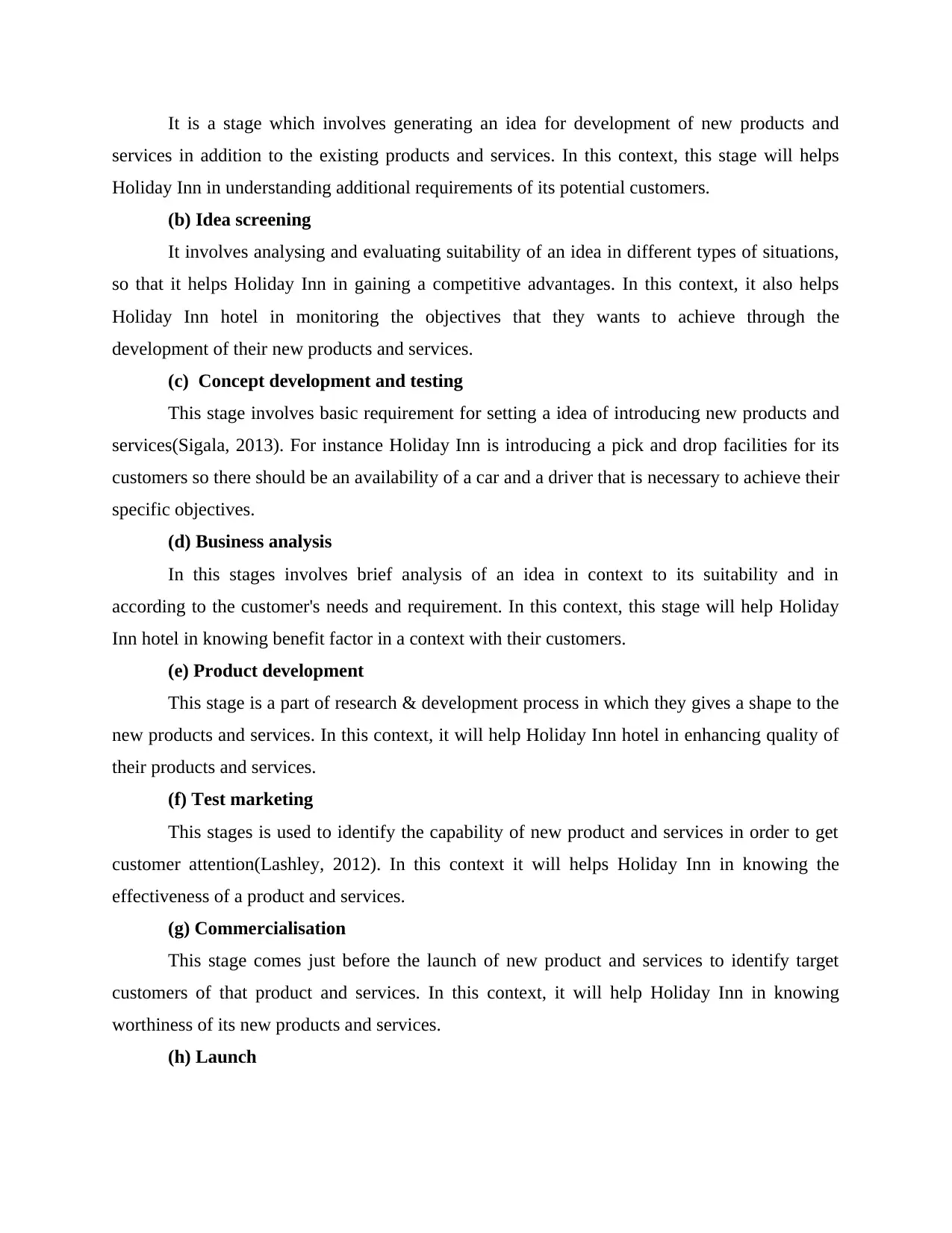
It is a stage which involves generating an idea for development of new products and
services in addition to the existing products and services. In this context, this stage will helps
Holiday Inn in understanding additional requirements of its potential customers.
(b) Idea screening
It involves analysing and evaluating suitability of an idea in different types of situations,
so that it helps Holiday Inn in gaining a competitive advantages. In this context, it also helps
Holiday Inn hotel in monitoring the objectives that they wants to achieve through the
development of their new products and services.
(c) Concept development and testing
This stage involves basic requirement for setting a idea of introducing new products and
services(Sigala, 2013). For instance Holiday Inn is introducing a pick and drop facilities for its
customers so there should be an availability of a car and a driver that is necessary to achieve their
specific objectives.
(d) Business analysis
In this stages involves brief analysis of an idea in context to its suitability and in
according to the customer's needs and requirement. In this context, this stage will help Holiday
Inn hotel in knowing benefit factor in a context with their customers.
(e) Product development
This stage is a part of research & development process in which they gives a shape to the
new products and services. In this context, it will help Holiday Inn hotel in enhancing quality of
their products and services.
(f) Test marketing
This stages is used to identify the capability of new product and services in order to get
customer attention(Lashley, 2012). In this context it will helps Holiday Inn in knowing the
effectiveness of a product and services.
(g) Commercialisation
This stage comes just before the launch of new product and services to identify target
customers of that product and services. In this context, it will help Holiday Inn in knowing
worthiness of its new products and services.
(h) Launch
services in addition to the existing products and services. In this context, this stage will helps
Holiday Inn in understanding additional requirements of its potential customers.
(b) Idea screening
It involves analysing and evaluating suitability of an idea in different types of situations,
so that it helps Holiday Inn in gaining a competitive advantages. In this context, it also helps
Holiday Inn hotel in monitoring the objectives that they wants to achieve through the
development of their new products and services.
(c) Concept development and testing
This stage involves basic requirement for setting a idea of introducing new products and
services(Sigala, 2013). For instance Holiday Inn is introducing a pick and drop facilities for its
customers so there should be an availability of a car and a driver that is necessary to achieve their
specific objectives.
(d) Business analysis
In this stages involves brief analysis of an idea in context to its suitability and in
according to the customer's needs and requirement. In this context, this stage will help Holiday
Inn hotel in knowing benefit factor in a context with their customers.
(e) Product development
This stage is a part of research & development process in which they gives a shape to the
new products and services. In this context, it will help Holiday Inn hotel in enhancing quality of
their products and services.
(f) Test marketing
This stages is used to identify the capability of new product and services in order to get
customer attention(Lashley, 2012). In this context it will helps Holiday Inn in knowing the
effectiveness of a product and services.
(g) Commercialisation
This stage comes just before the launch of new product and services to identify target
customers of that product and services. In this context, it will help Holiday Inn in knowing
worthiness of its new products and services.
(h) Launch
⊘ This is a preview!⊘
Do you want full access?
Subscribe today to unlock all pages.

Trusted by 1+ million students worldwide
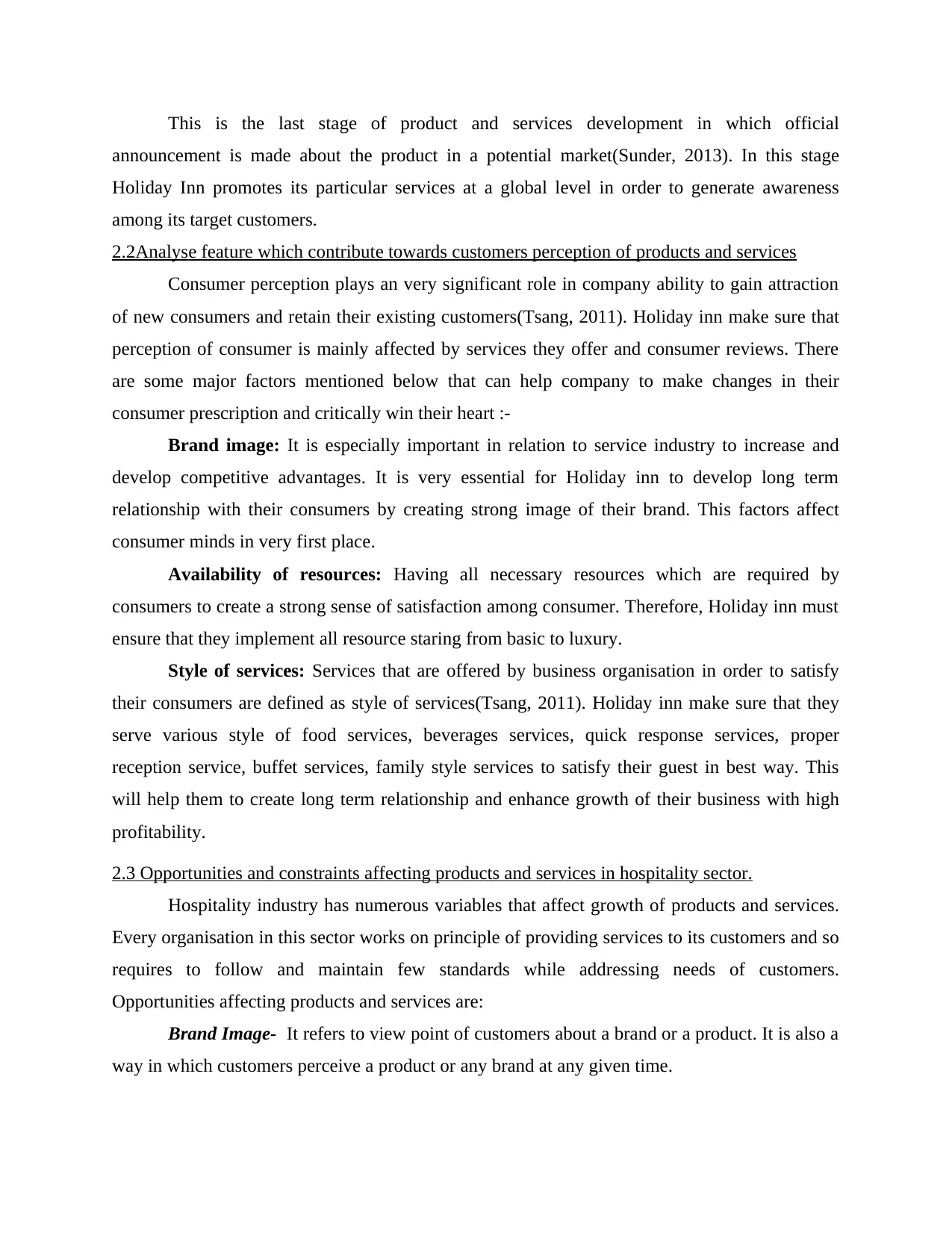
This is the last stage of product and services development in which official
announcement is made about the product in a potential market(Sunder, 2013). In this stage
Holiday Inn promotes its particular services at a global level in order to generate awareness
among its target customers.
2.2Analyse feature which contribute towards customers perception of products and services
Consumer perception plays an very significant role in company ability to gain attraction
of new consumers and retain their existing customers(Tsang, 2011). Holiday inn make sure that
perception of consumer is mainly affected by services they offer and consumer reviews. There
are some major factors mentioned below that can help company to make changes in their
consumer prescription and critically win their heart :-
Brand image: It is especially important in relation to service industry to increase and
develop competitive advantages. It is very essential for Holiday inn to develop long term
relationship with their consumers by creating strong image of their brand. This factors affect
consumer minds in very first place.
Availability of resources: Having all necessary resources which are required by
consumers to create a strong sense of satisfaction among consumer. Therefore, Holiday inn must
ensure that they implement all resource staring from basic to luxury.
Style of services: Services that are offered by business organisation in order to satisfy
their consumers are defined as style of services(Tsang, 2011). Holiday inn make sure that they
serve various style of food services, beverages services, quick response services, proper
reception service, buffet services, family style services to satisfy their guest in best way. This
will help them to create long term relationship and enhance growth of their business with high
profitability.
2.3 Opportunities and constraints affecting products and services in hospitality sector.
Hospitality industry has numerous variables that affect growth of products and services.
Every organisation in this sector works on principle of providing services to its customers and so
requires to follow and maintain few standards while addressing needs of customers.
Opportunities affecting products and services are:
Brand Image- It refers to view point of customers about a brand or a product. It is also a
way in which customers perceive a product or any brand at any given time.
announcement is made about the product in a potential market(Sunder, 2013). In this stage
Holiday Inn promotes its particular services at a global level in order to generate awareness
among its target customers.
2.2Analyse feature which contribute towards customers perception of products and services
Consumer perception plays an very significant role in company ability to gain attraction
of new consumers and retain their existing customers(Tsang, 2011). Holiday inn make sure that
perception of consumer is mainly affected by services they offer and consumer reviews. There
are some major factors mentioned below that can help company to make changes in their
consumer prescription and critically win their heart :-
Brand image: It is especially important in relation to service industry to increase and
develop competitive advantages. It is very essential for Holiday inn to develop long term
relationship with their consumers by creating strong image of their brand. This factors affect
consumer minds in very first place.
Availability of resources: Having all necessary resources which are required by
consumers to create a strong sense of satisfaction among consumer. Therefore, Holiday inn must
ensure that they implement all resource staring from basic to luxury.
Style of services: Services that are offered by business organisation in order to satisfy
their consumers are defined as style of services(Tsang, 2011). Holiday inn make sure that they
serve various style of food services, beverages services, quick response services, proper
reception service, buffet services, family style services to satisfy their guest in best way. This
will help them to create long term relationship and enhance growth of their business with high
profitability.
2.3 Opportunities and constraints affecting products and services in hospitality sector.
Hospitality industry has numerous variables that affect growth of products and services.
Every organisation in this sector works on principle of providing services to its customers and so
requires to follow and maintain few standards while addressing needs of customers.
Opportunities affecting products and services are:
Brand Image- It refers to view point of customers about a brand or a product. It is also a
way in which customers perceive a product or any brand at any given time.
Paraphrase This Document
Need a fresh take? Get an instant paraphrase of this document with our AI Paraphraser
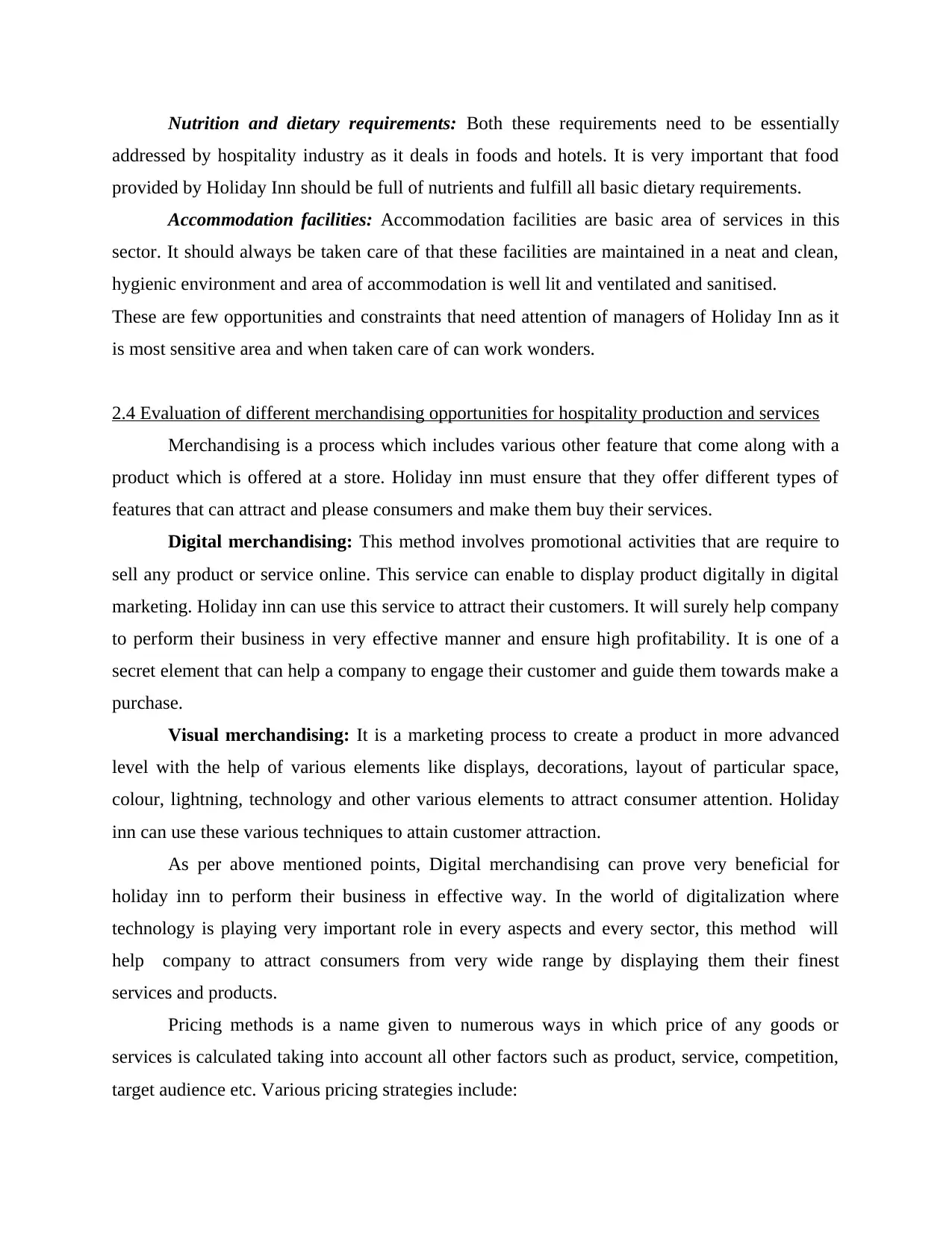
Nutrition and dietary requirements: Both these requirements need to be essentially
addressed by hospitality industry as it deals in foods and hotels. It is very important that food
provided by Holiday Inn should be full of nutrients and fulfill all basic dietary requirements.
Accommodation facilities: Accommodation facilities are basic area of services in this
sector. It should always be taken care of that these facilities are maintained in a neat and clean,
hygienic environment and area of accommodation is well lit and ventilated and sanitised.
These are few opportunities and constraints that need attention of managers of Holiday Inn as it
is most sensitive area and when taken care of can work wonders.
2.4 Evaluation of different merchandising opportunities for hospitality production and services
Merchandising is a process which includes various other feature that come along with a
product which is offered at a store. Holiday inn must ensure that they offer different types of
features that can attract and please consumers and make them buy their services.
Digital merchandising: This method involves promotional activities that are require to
sell any product or service online. This service can enable to display product digitally in digital
marketing. Holiday inn can use this service to attract their customers. It will surely help company
to perform their business in very effective manner and ensure high profitability. It is one of a
secret element that can help a company to engage their customer and guide them towards make a
purchase.
Visual merchandising: It is a marketing process to create a product in more advanced
level with the help of various elements like displays, decorations, layout of particular space,
colour, lightning, technology and other various elements to attract consumer attention. Holiday
inn can use these various techniques to attain customer attraction.
As per above mentioned points, Digital merchandising can prove very beneficial for
holiday inn to perform their business in effective way. In the world of digitalization where
technology is playing very important role in every aspects and every sector, this method will
help company to attract consumers from very wide range by displaying them their finest
services and products.
Pricing methods is a name given to numerous ways in which price of any goods or
services is calculated taking into account all other factors such as product, service, competition,
target audience etc. Various pricing strategies include:
addressed by hospitality industry as it deals in foods and hotels. It is very important that food
provided by Holiday Inn should be full of nutrients and fulfill all basic dietary requirements.
Accommodation facilities: Accommodation facilities are basic area of services in this
sector. It should always be taken care of that these facilities are maintained in a neat and clean,
hygienic environment and area of accommodation is well lit and ventilated and sanitised.
These are few opportunities and constraints that need attention of managers of Holiday Inn as it
is most sensitive area and when taken care of can work wonders.
2.4 Evaluation of different merchandising opportunities for hospitality production and services
Merchandising is a process which includes various other feature that come along with a
product which is offered at a store. Holiday inn must ensure that they offer different types of
features that can attract and please consumers and make them buy their services.
Digital merchandising: This method involves promotional activities that are require to
sell any product or service online. This service can enable to display product digitally in digital
marketing. Holiday inn can use this service to attract their customers. It will surely help company
to perform their business in very effective manner and ensure high profitability. It is one of a
secret element that can help a company to engage their customer and guide them towards make a
purchase.
Visual merchandising: It is a marketing process to create a product in more advanced
level with the help of various elements like displays, decorations, layout of particular space,
colour, lightning, technology and other various elements to attract consumer attention. Holiday
inn can use these various techniques to attain customer attraction.
As per above mentioned points, Digital merchandising can prove very beneficial for
holiday inn to perform their business in effective way. In the world of digitalization where
technology is playing very important role in every aspects and every sector, this method will
help company to attract consumers from very wide range by displaying them their finest
services and products.
Pricing methods is a name given to numerous ways in which price of any goods or
services is calculated taking into account all other factors such as product, service, competition,
target audience etc. Various pricing strategies include:
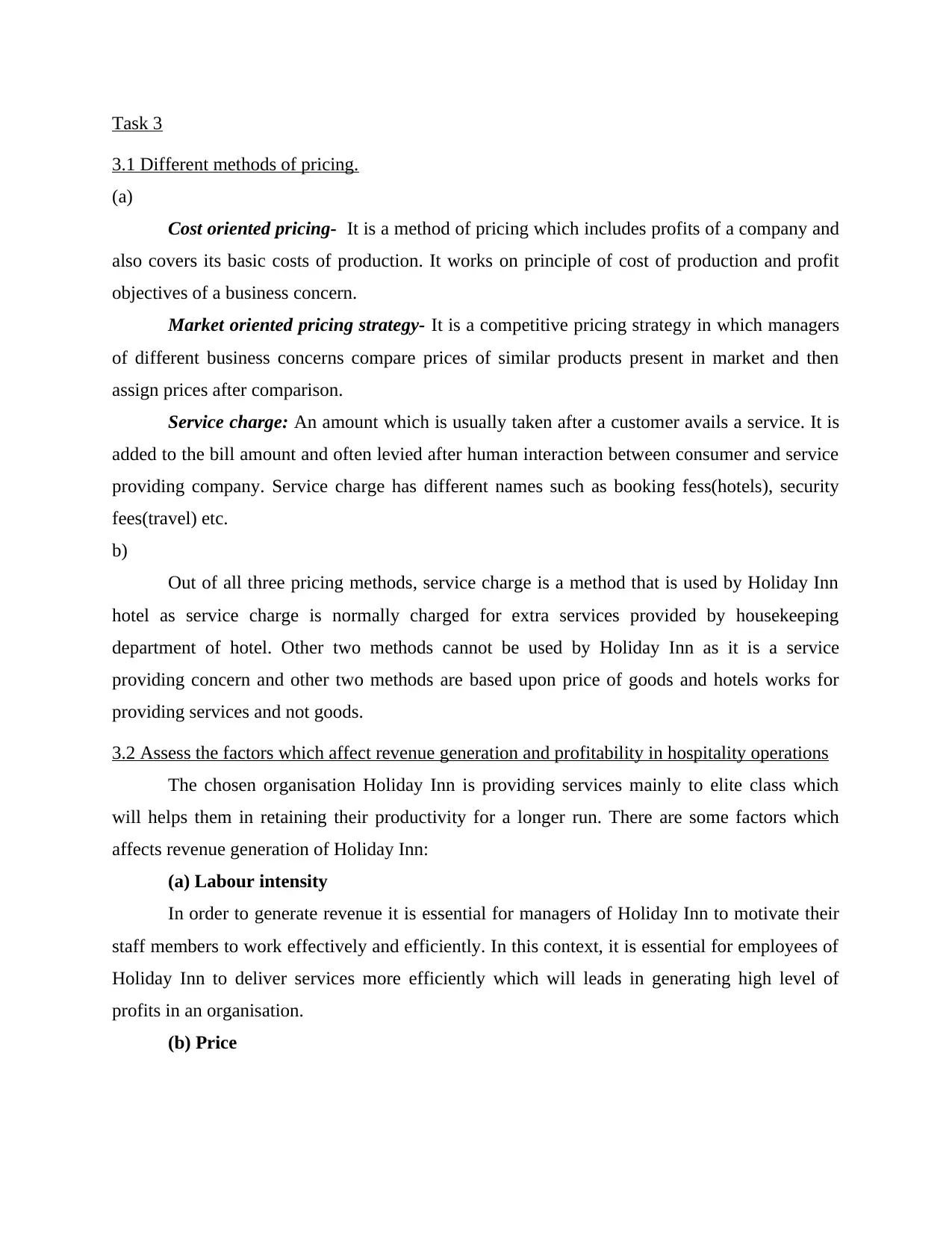
Task 3
3.1 Different methods of pricing.
(a)
Cost oriented pricing- It is a method of pricing which includes profits of a company and
also covers its basic costs of production. It works on principle of cost of production and profit
objectives of a business concern.
Market oriented pricing strategy- It is a competitive pricing strategy in which managers
of different business concerns compare prices of similar products present in market and then
assign prices after comparison.
Service charge: An amount which is usually taken after a customer avails a service. It is
added to the bill amount and often levied after human interaction between consumer and service
providing company. Service charge has different names such as booking fess(hotels), security
fees(travel) etc.
b)
Out of all three pricing methods, service charge is a method that is used by Holiday Inn
hotel as service charge is normally charged for extra services provided by housekeeping
department of hotel. Other two methods cannot be used by Holiday Inn as it is a service
providing concern and other two methods are based upon price of goods and hotels works for
providing services and not goods.
3.2 Assess the factors which affect revenue generation and profitability in hospitality operations
The chosen organisation Holiday Inn is providing services mainly to elite class which
will helps them in retaining their productivity for a longer run. There are some factors which
affects revenue generation of Holiday Inn:
(a) Labour intensity
In order to generate revenue it is essential for managers of Holiday Inn to motivate their
staff members to work effectively and efficiently. In this context, it is essential for employees of
Holiday Inn to deliver services more efficiently which will leads in generating high level of
profits in an organisation.
(b) Price
3.1 Different methods of pricing.
(a)
Cost oriented pricing- It is a method of pricing which includes profits of a company and
also covers its basic costs of production. It works on principle of cost of production and profit
objectives of a business concern.
Market oriented pricing strategy- It is a competitive pricing strategy in which managers
of different business concerns compare prices of similar products present in market and then
assign prices after comparison.
Service charge: An amount which is usually taken after a customer avails a service. It is
added to the bill amount and often levied after human interaction between consumer and service
providing company. Service charge has different names such as booking fess(hotels), security
fees(travel) etc.
b)
Out of all three pricing methods, service charge is a method that is used by Holiday Inn
hotel as service charge is normally charged for extra services provided by housekeeping
department of hotel. Other two methods cannot be used by Holiday Inn as it is a service
providing concern and other two methods are based upon price of goods and hotels works for
providing services and not goods.
3.2 Assess the factors which affect revenue generation and profitability in hospitality operations
The chosen organisation Holiday Inn is providing services mainly to elite class which
will helps them in retaining their productivity for a longer run. There are some factors which
affects revenue generation of Holiday Inn:
(a) Labour intensity
In order to generate revenue it is essential for managers of Holiday Inn to motivate their
staff members to work effectively and efficiently. In this context, it is essential for employees of
Holiday Inn to deliver services more efficiently which will leads in generating high level of
profits in an organisation.
(b) Price
⊘ This is a preview!⊘
Do you want full access?
Subscribe today to unlock all pages.

Trusted by 1+ million students worldwide
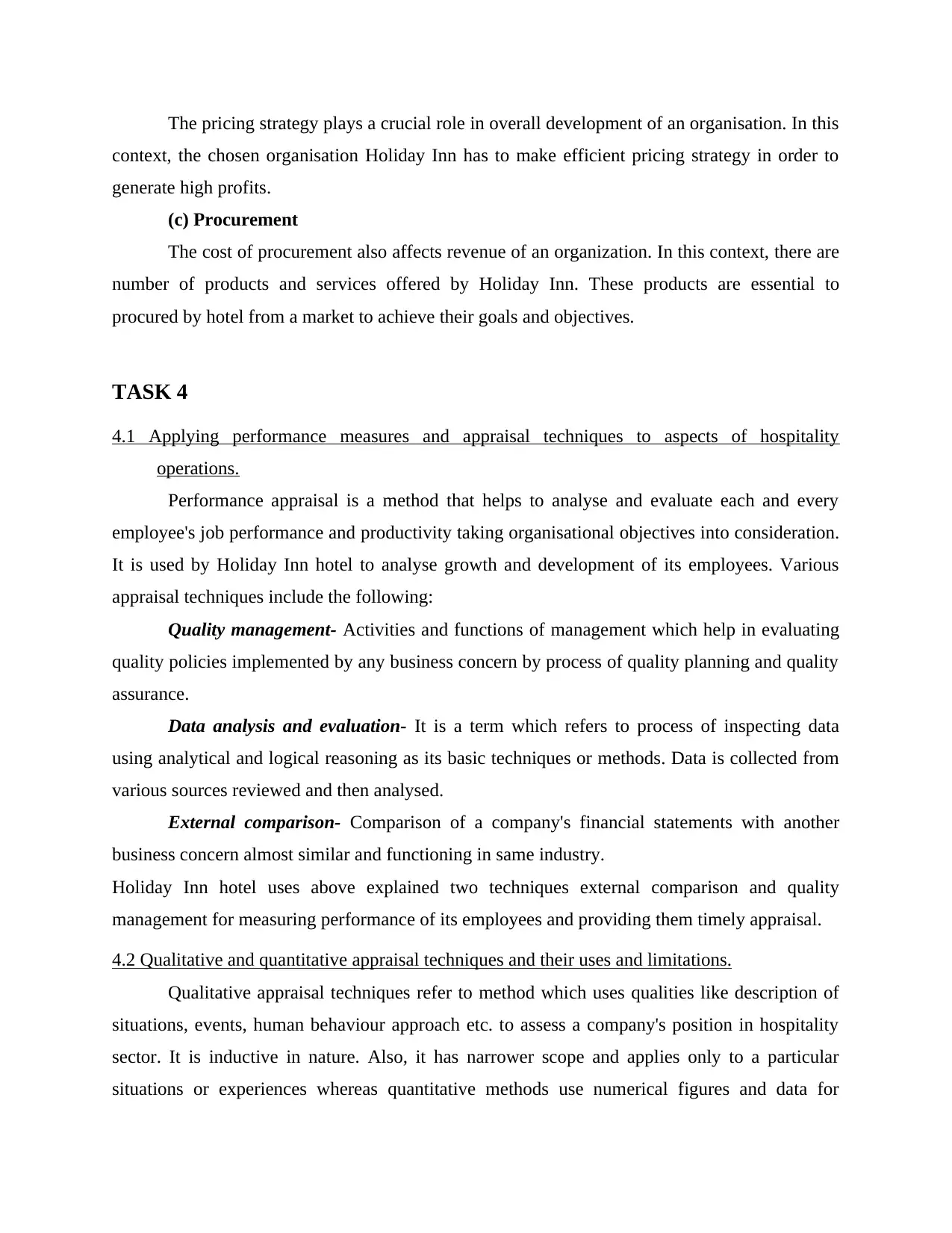
The pricing strategy plays a crucial role in overall development of an organisation. In this
context, the chosen organisation Holiday Inn has to make efficient pricing strategy in order to
generate high profits.
(c) Procurement
The cost of procurement also affects revenue of an organization. In this context, there are
number of products and services offered by Holiday Inn. These products are essential to
procured by hotel from a market to achieve their goals and objectives.
TASK 4
4.1 Applying performance measures and appraisal techniques to aspects of hospitality
operations.
Performance appraisal is a method that helps to analyse and evaluate each and every
employee's job performance and productivity taking organisational objectives into consideration.
It is used by Holiday Inn hotel to analyse growth and development of its employees. Various
appraisal techniques include the following:
Quality management- Activities and functions of management which help in evaluating
quality policies implemented by any business concern by process of quality planning and quality
assurance.
Data analysis and evaluation- It is a term which refers to process of inspecting data
using analytical and logical reasoning as its basic techniques or methods. Data is collected from
various sources reviewed and then analysed.
External comparison- Comparison of a company's financial statements with another
business concern almost similar and functioning in same industry.
Holiday Inn hotel uses above explained two techniques external comparison and quality
management for measuring performance of its employees and providing them timely appraisal.
4.2 Qualitative and quantitative appraisal techniques and their uses and limitations.
Qualitative appraisal techniques refer to method which uses qualities like description of
situations, events, human behaviour approach etc. to assess a company's position in hospitality
sector. It is inductive in nature. Also, it has narrower scope and applies only to a particular
situations or experiences whereas quantitative methods use numerical figures and data for
context, the chosen organisation Holiday Inn has to make efficient pricing strategy in order to
generate high profits.
(c) Procurement
The cost of procurement also affects revenue of an organization. In this context, there are
number of products and services offered by Holiday Inn. These products are essential to
procured by hotel from a market to achieve their goals and objectives.
TASK 4
4.1 Applying performance measures and appraisal techniques to aspects of hospitality
operations.
Performance appraisal is a method that helps to analyse and evaluate each and every
employee's job performance and productivity taking organisational objectives into consideration.
It is used by Holiday Inn hotel to analyse growth and development of its employees. Various
appraisal techniques include the following:
Quality management- Activities and functions of management which help in evaluating
quality policies implemented by any business concern by process of quality planning and quality
assurance.
Data analysis and evaluation- It is a term which refers to process of inspecting data
using analytical and logical reasoning as its basic techniques or methods. Data is collected from
various sources reviewed and then analysed.
External comparison- Comparison of a company's financial statements with another
business concern almost similar and functioning in same industry.
Holiday Inn hotel uses above explained two techniques external comparison and quality
management for measuring performance of its employees and providing them timely appraisal.
4.2 Qualitative and quantitative appraisal techniques and their uses and limitations.
Qualitative appraisal techniques refer to method which uses qualities like description of
situations, events, human behaviour approach etc. to assess a company's position in hospitality
sector. It is inductive in nature. Also, it has narrower scope and applies only to a particular
situations or experiences whereas quantitative methods use numerical figures and data for
Paraphrase This Document
Need a fresh take? Get an instant paraphrase of this document with our AI Paraphraser
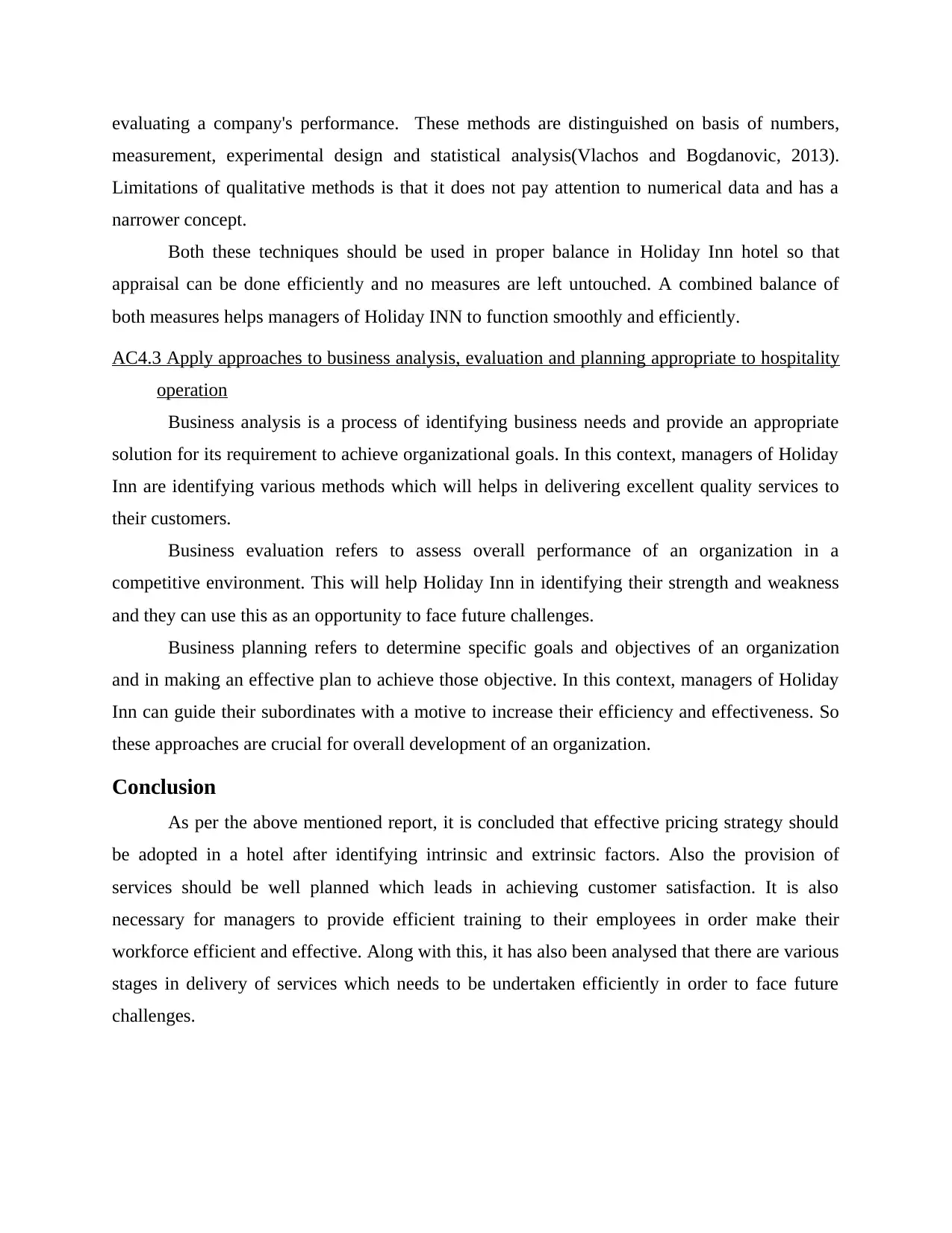
evaluating a company's performance. These methods are distinguished on basis of numbers,
measurement, experimental design and statistical analysis(Vlachos and Bogdanovic, 2013).
Limitations of qualitative methods is that it does not pay attention to numerical data and has a
narrower concept.
Both these techniques should be used in proper balance in Holiday Inn hotel so that
appraisal can be done efficiently and no measures are left untouched. A combined balance of
both measures helps managers of Holiday INN to function smoothly and efficiently.
AC4.3 Apply approaches to business analysis, evaluation and planning appropriate to hospitality
operation
Business analysis is a process of identifying business needs and provide an appropriate
solution for its requirement to achieve organizational goals. In this context, managers of Holiday
Inn are identifying various methods which will helps in delivering excellent quality services to
their customers.
Business evaluation refers to assess overall performance of an organization in a
competitive environment. This will help Holiday Inn in identifying their strength and weakness
and they can use this as an opportunity to face future challenges.
Business planning refers to determine specific goals and objectives of an organization
and in making an effective plan to achieve those objective. In this context, managers of Holiday
Inn can guide their subordinates with a motive to increase their efficiency and effectiveness. So
these approaches are crucial for overall development of an organization.
Conclusion
As per the above mentioned report, it is concluded that effective pricing strategy should
be adopted in a hotel after identifying intrinsic and extrinsic factors. Also the provision of
services should be well planned which leads in achieving customer satisfaction. It is also
necessary for managers to provide efficient training to their employees in order make their
workforce efficient and effective. Along with this, it has also been analysed that there are various
stages in delivery of services which needs to be undertaken efficiently in order to face future
challenges.
measurement, experimental design and statistical analysis(Vlachos and Bogdanovic, 2013).
Limitations of qualitative methods is that it does not pay attention to numerical data and has a
narrower concept.
Both these techniques should be used in proper balance in Holiday Inn hotel so that
appraisal can be done efficiently and no measures are left untouched. A combined balance of
both measures helps managers of Holiday INN to function smoothly and efficiently.
AC4.3 Apply approaches to business analysis, evaluation and planning appropriate to hospitality
operation
Business analysis is a process of identifying business needs and provide an appropriate
solution for its requirement to achieve organizational goals. In this context, managers of Holiday
Inn are identifying various methods which will helps in delivering excellent quality services to
their customers.
Business evaluation refers to assess overall performance of an organization in a
competitive environment. This will help Holiday Inn in identifying their strength and weakness
and they can use this as an opportunity to face future challenges.
Business planning refers to determine specific goals and objectives of an organization
and in making an effective plan to achieve those objective. In this context, managers of Holiday
Inn can guide their subordinates with a motive to increase their efficiency and effectiveness. So
these approaches are crucial for overall development of an organization.
Conclusion
As per the above mentioned report, it is concluded that effective pricing strategy should
be adopted in a hotel after identifying intrinsic and extrinsic factors. Also the provision of
services should be well planned which leads in achieving customer satisfaction. It is also
necessary for managers to provide efficient training to their employees in order make their
workforce efficient and effective. Along with this, it has also been analysed that there are various
stages in delivery of services which needs to be undertaken efficiently in order to face future
challenges.
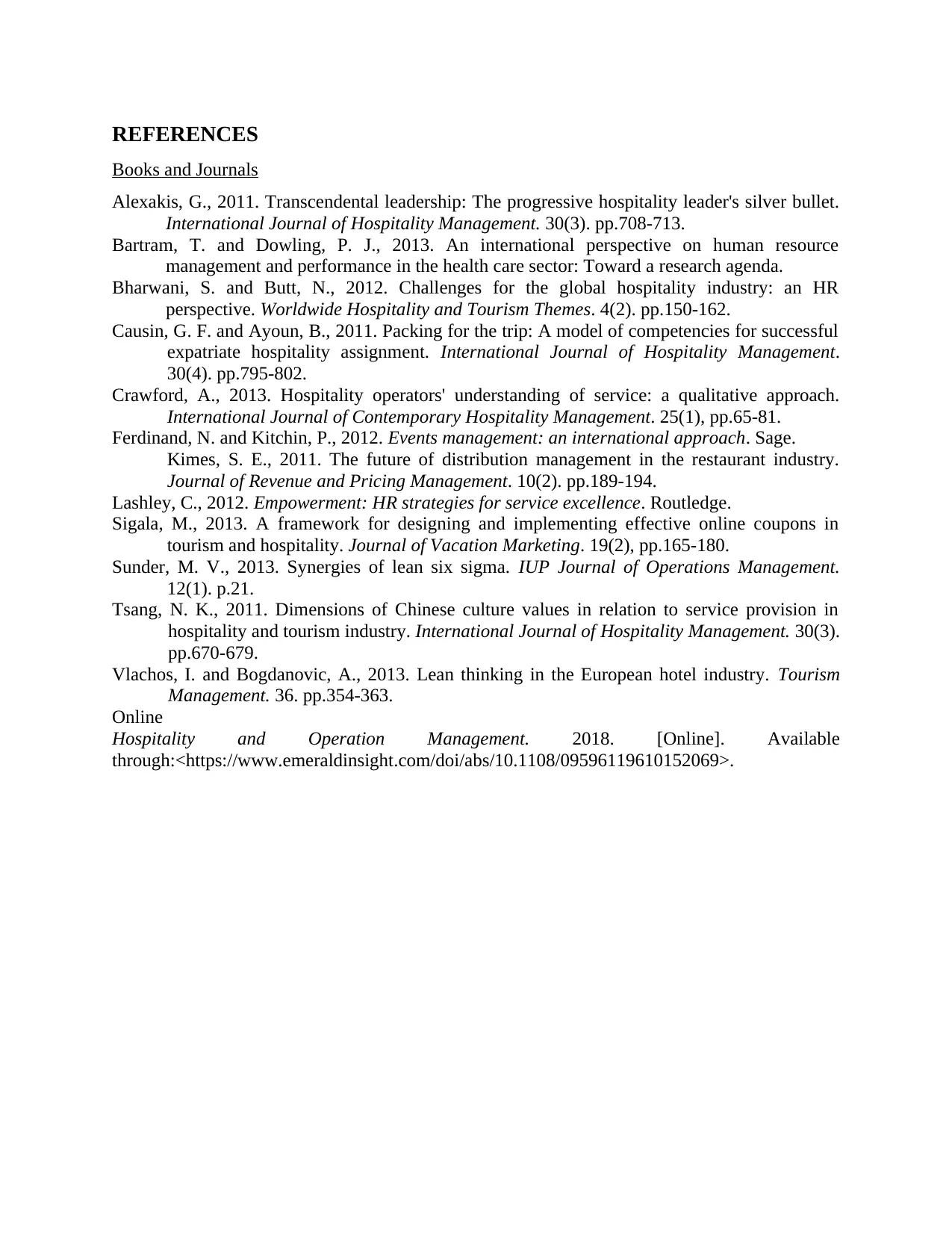
REFERENCES
Books and Journals
Alexakis, G., 2011. Transcendental leadership: The progressive hospitality leader's silver bullet.
International Journal of Hospitality Management. 30(3). pp.708-713.
Bartram, T. and Dowling, P. J., 2013. An international perspective on human resource
management and performance in the health care sector: Toward a research agenda.
Bharwani, S. and Butt, N., 2012. Challenges for the global hospitality industry: an HR
perspective. Worldwide Hospitality and Tourism Themes. 4(2). pp.150-162.
Causin, G. F. and Ayoun, B., 2011. Packing for the trip: A model of competencies for successful
expatriate hospitality assignment. International Journal of Hospitality Management.
30(4). pp.795-802.
Crawford, A., 2013. Hospitality operators' understanding of service: a qualitative approach.
International Journal of Contemporary Hospitality Management. 25(1), pp.65-81.
Ferdinand, N. and Kitchin, P., 2012. Events management: an international approach. Sage.
Kimes, S. E., 2011. The future of distribution management in the restaurant industry.
Journal of Revenue and Pricing Management. 10(2). pp.189-194.
Lashley, C., 2012. Empowerment: HR strategies for service excellence. Routledge.
Sigala, M., 2013. A framework for designing and implementing effective online coupons in
tourism and hospitality. Journal of Vacation Marketing. 19(2), pp.165-180.
Sunder, M. V., 2013. Synergies of lean six sigma. IUP Journal of Operations Management.
12(1). p.21.
Tsang, N. K., 2011. Dimensions of Chinese culture values in relation to service provision in
hospitality and tourism industry. International Journal of Hospitality Management. 30(3).
pp.670-679.
Vlachos, I. and Bogdanovic, A., 2013. Lean thinking in the European hotel industry. Tourism
Management. 36. pp.354-363.
Online
Hospitality and Operation Management. 2018. [Online]. Available
through:<https://www.emeraldinsight.com/doi/abs/10.1108/09596119610152069>.
Books and Journals
Alexakis, G., 2011. Transcendental leadership: The progressive hospitality leader's silver bullet.
International Journal of Hospitality Management. 30(3). pp.708-713.
Bartram, T. and Dowling, P. J., 2013. An international perspective on human resource
management and performance in the health care sector: Toward a research agenda.
Bharwani, S. and Butt, N., 2012. Challenges for the global hospitality industry: an HR
perspective. Worldwide Hospitality and Tourism Themes. 4(2). pp.150-162.
Causin, G. F. and Ayoun, B., 2011. Packing for the trip: A model of competencies for successful
expatriate hospitality assignment. International Journal of Hospitality Management.
30(4). pp.795-802.
Crawford, A., 2013. Hospitality operators' understanding of service: a qualitative approach.
International Journal of Contemporary Hospitality Management. 25(1), pp.65-81.
Ferdinand, N. and Kitchin, P., 2012. Events management: an international approach. Sage.
Kimes, S. E., 2011. The future of distribution management in the restaurant industry.
Journal of Revenue and Pricing Management. 10(2). pp.189-194.
Lashley, C., 2012. Empowerment: HR strategies for service excellence. Routledge.
Sigala, M., 2013. A framework for designing and implementing effective online coupons in
tourism and hospitality. Journal of Vacation Marketing. 19(2), pp.165-180.
Sunder, M. V., 2013. Synergies of lean six sigma. IUP Journal of Operations Management.
12(1). p.21.
Tsang, N. K., 2011. Dimensions of Chinese culture values in relation to service provision in
hospitality and tourism industry. International Journal of Hospitality Management. 30(3).
pp.670-679.
Vlachos, I. and Bogdanovic, A., 2013. Lean thinking in the European hotel industry. Tourism
Management. 36. pp.354-363.
Online
Hospitality and Operation Management. 2018. [Online]. Available
through:<https://www.emeraldinsight.com/doi/abs/10.1108/09596119610152069>.
⊘ This is a preview!⊘
Do you want full access?
Subscribe today to unlock all pages.

Trusted by 1+ million students worldwide
1 out of 14
Related Documents
Your All-in-One AI-Powered Toolkit for Academic Success.
+13062052269
info@desklib.com
Available 24*7 on WhatsApp / Email
![[object Object]](/_next/static/media/star-bottom.7253800d.svg)
Unlock your academic potential
Copyright © 2020–2026 A2Z Services. All Rights Reserved. Developed and managed by ZUCOL.





